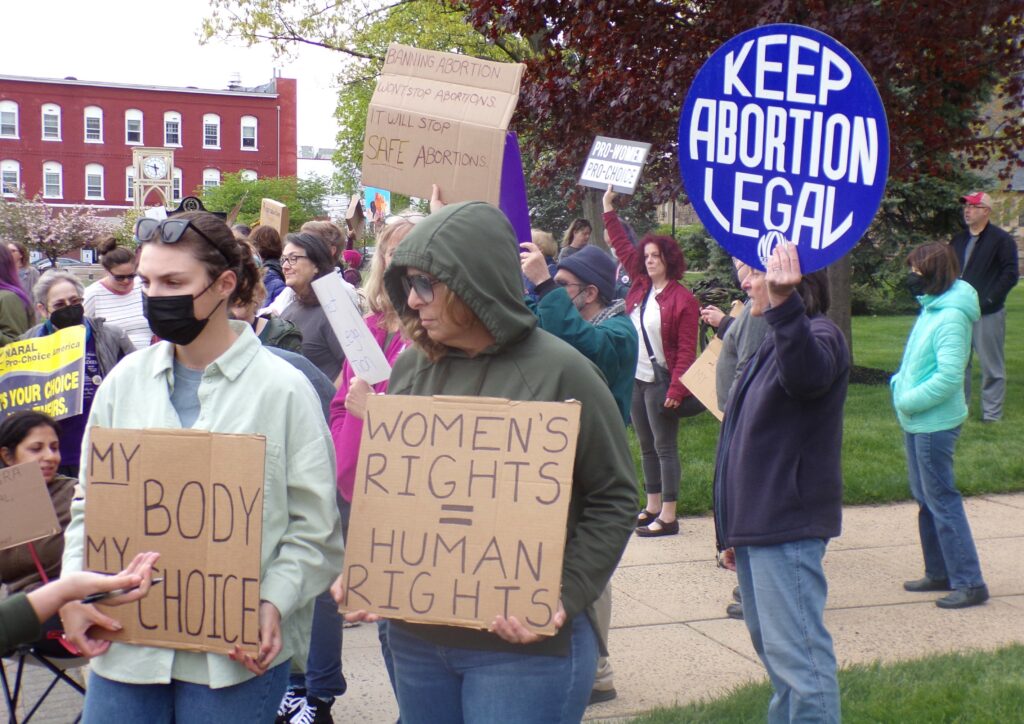Abortion is Now on your Ballot

Ever since Roe v. Wade, despite overwhelming public support for legal abortion, the issue has been a driving force in elections in the United States. Because it can also be a divisive issue, a host of women’s organizations at the federal and state level, including National Organization for Women, ask about abortion on their endorsement questionnaires and only support candidates who commit to protecting and expanding access to reproductive health care services, including abortion.
Reproductive rights are an issue of reproductive justice, racial justice, and economic justice. Access to abortion allows women and all who can become pregnant the ability to control their own reproductive destinies—which is essential to their long term economic security and well being. In his 1973 opinion in the historic Roe v. Wade decision, Justice Blackmun noted that by denying access to abortion, the State imposes an apparent “detriment” on a pregnant person, including among other harms, mental and physical health and “may force upon the woman a distressful life and future.” Indeed, New Jerseyans agree with this outlook: a 2021 Rutgers/Eagleton poll showed that New Jerseyans follow national data with over two-thirds (67%) of all voters, and 69% of women, agreeing that abortion should be legal in all or most cases.
Equal pay is essential to achieving economic justice, and economic justice and reproductive justice are inextricably linked. If women are to achieve true equality in our society, we must be allowed to make our own reproductive decisions without any interference from the State. Unwanted and now ‘forced’ pregnancies make women prey to the so-called “motherhood penalty,” the drop in earnings experienced by women once they become parents—a common explanation for the gender pay gap. And the fact that the pay gap is significantly wider for Black, Latina and indigenous women makes this a racial justice issue. Pay inequity, brought about by a lack of reproductive control, hurts women, hurts families, and hurts the economy.
Last year 86% of Democrats and 55% of Independent voters in New Jersey expressed concern that the Supreme Court may overturn Roe. With the United States Supreme Court now [effectively] overturning its own landmark ruling that made abortion legal nearly fifty years ago, make no mistake — the voters are watching.
National surveys indicate that attacks on reproductive rights can be a winning message to turn a persuadable majority into single issue voters on abortion. And just as anti-abortion politicians mobilized to pack a Supreme Court that would render a devastating blow to Roe, voters who support access to reproductive health care are energized to keep control of Congress in 2022. These voters are ready to take the fight to state elections and to statehouses across the country, and here in New Jersey. This November, abortion will be front and center in the minds of voters as they head to polls in the 2022 midterms and beyond. Abortion will be on the ballot.
Anjali Mehrotra is a fierce feminist and abortion access activist. She is on the Board of the National Organization for Women, the largest feminist membership organization in the country and is President of the National Organization for Women of New Jersey. Anjali was a key voice in protecting abortion access in New Jersey and vows to continue the fight to protect it.






The Cygnal survey of likely voters in 15 battleground states conducted for the Republican State Leadership Committee found that the top issues for most voters were inflation, the economy and jobs at a combined 56%, followed by crime at 9%, and then abortion at 8%. “Abortion isn’t a top issue for voters — not even close,” RSLC president Dee Duncan said. “While abortion is an issue people care about, the data makes clear that it is not among the top issues that will drive voting behavior in November. Instead, this election will remain about Biden’s failing economy.” The poll was conducted June 24-26, immediately after the Supreme Court released its opinion Friday in Dobbs v. Jackson that overturned the 1973 Roe v. Wade ruling that legalized abortion nationwide.
I have to think the voters in the near future will correct this SCOTUS mistake but no way of knowing how many ladies will have to endure the ultimate consequence of their decision. So unfortunate.
No it's NOT. Out-of-control gas prices, Double-digit inflation, the open border, CTR and graphic sex-ed to children, lack of baby formula, botched foreign policies, extreme abortion policy, and MORE are on the ballot!